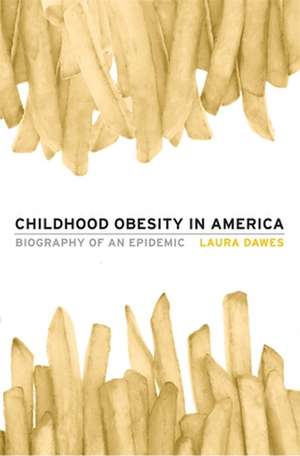Childhood Obesity in America – Biography of an Epidemic
Autor Laura Dawesen Limba Engleză Hardback – 2 iun 2014
Excess weight was once thought to be something children outgrew, or even a safeguard against infectious disease. But by the mid-twentieth century, researchers recognized early obesity as an indicator of lifelong troubles. Debates about its causes and proper treatment multiplied. Over the century, fat children were injected with animal glands, psychoanalyzed, given amphetamines, and sent to fat camp. In recent decades, an emphasis on taking personal responsibility for one's health, combined with commercial interests, has affected the way the public health establishment has responded to childhood obesity--and the stigma fat children face. At variance with this personal emphasis is the realization that societal factors, including fast food, unsafe neighborhoods, and marketing targeted at children, are strongly implicated in weight gain. Activists and the courts are the most recent players in the obesity epidemic's biography.
Today, obesity in this age group is seen as a complex condition, with metabolic, endocrine, genetic, psychological, and social elements. Laura Dawes makes a powerful case that understanding the cultural history of a disease is critical to developing effective health policy.
Preț: 429.85 lei
Nou
Puncte Express: 645
Preț estimativ în valută:
82.26€ • 85.57$ • 67.91£
82.26€ • 85.57$ • 67.91£
Carte tipărită la comandă
Livrare economică 14-28 aprilie
Preluare comenzi: 021 569.72.76
Specificații
ISBN-13: 9780674281448
ISBN-10: 0674281446
Pagini: 320
Dimensiuni: 161 x 240 x 28 mm
Greutate: 0.59 kg
Ediția:New.
Editura: Harvard University Press
ISBN-10: 0674281446
Pagini: 320
Dimensiuni: 161 x 240 x 28 mm
Greutate: 0.59 kg
Ediția:New.
Editura: Harvard University Press
Notă biografică
Descriere
Obesity among American children has reached epidemic proportions. Laura Dawes traces changes in diagnosis, treatment, and popular conceptions of the most serious health problem facing American children today, and makes the case that understanding the cultural history of a disease is critical to developing effective public health policy.









